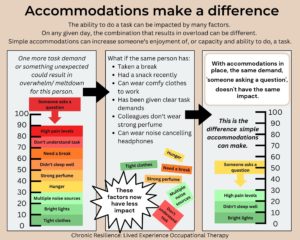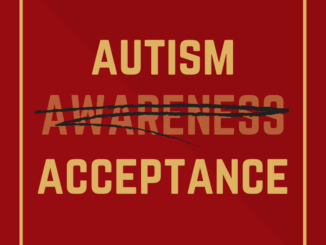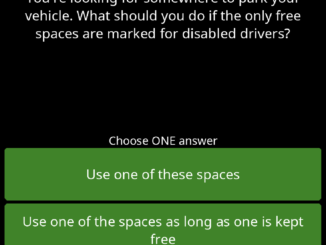Many neurodivergent people (not just Autistic people, but including Autistic people) have skills that fluctuate from day to day.
This comes up so often in IEP meetings that I’m sitting in. People will say of the child in their class, or of the child that they’re the parent of: “I know he knows how to X, because he X sometimes but not other times.” They will then continue: “So I know that when he doesn’t X, it’s because he’s choosing not to.”
I’m here to tell you that the first sentence can be true, but the second sentence does not inherently follow the first.
“I know he/she/they know how to X, because they X sometimes.” Yes.
“So therefore, when they don’t X, it’s because they’re choosing not to.” No. Not necessarily.
I could write paragraphs of information explaining this, but I feel like the visual attached to this post does a better description than I could try to convey verbally. (I’m going to try to give a good enough image description of this image, though!)
Someone may be at 10% overwhelmed one day when you ask them to do X, and at 90% overwhelmed on another day when you ask them to do X. Maybe they need a little help with X on those days, or maybe they need the expectation to be dropped, or maybe they need you to do it for them—there can be lots of ways to deal with that overwhelm.
But I know it’s really tempting, even for people who do believe that kids want to do their best, to assume that having done it before means that they can do it again and do it always and do it under every circumstance. And it just doesn’t mean that. Maybe sensory factors are at play today that weren’t yesterday. Maybe there is fatigue or another interoceptive problem: they’re tired, they’re hungry, they’re thirsty, they need to toilet. Maybe there have been difficult or simply taxing social interactions today. Maybe they’ve already used all the executive functioning skills for the day that they had available. People do not have infinite resources.
That’s not because the person is choosing to be obstinate or choosing at all. It’s just because every day is not exactly the same.

[Image description:
This image is titled, “Accommodations make a difference”. Underneath the title it reads: “The ability to do a task can be impacted by many factors. On any given day, the combination that results in overload can be different. Simple accommodations can increase someone’s enjoyment of, or capacity and ability to do, a task.”
Beneath these words are 3 columns. The first column has an illustration of a scale that goes from 0 to 100, showing different blocks with descriptions on them showing what could be overwhelming that person. From 0-10 is “Tight clothes”. From 10-20 is “Bright lights”. And so on it continues, each 10% of overwhelm with a label on it: “Multiple noise sources,” “Hunger”, “Strong perfume”, “Didn’t sleep well,” “Need a break,” “Don’t understand task,” “High pain levels”. Finally, it shows that from 90-100 is the block “Someone asks a question.” This entire colum is labeled: One more task demand, or something unexpected, could result in overwhelm/meltdown for this person.
An arrow points from the first column to the second column.
The second column reads, “What if the same person has: taken a break, had a snack recently, can wear comfy clothes to work, has been given clear task demands, colleagues don’t wear strong perfume, and can wear noise cancelling headphones?” It shows “These factors now have less impact” with several of the factors from the prior post: Tight clothes, hunger, need a break, strong perfume, multiple noise sources, and don’t understand task have been taken off of the scale from 0-100.
An arrow points from the second column to the third column.
This one says, “With accommodations in place, the same demand, ‘someone asking a question’, doesn’t have the same impact. This is the difference simple accommodations can make.”
The same scale is shown, 0-100, but now the only factors remaining are 0-10 Bright Lights, 10-20 Didn’t sleep well, and 20-30 High pain levels. So when someone asks a question, it might take the person from 30-40…but it doesn’t take them to 100% overwhelmed.
The image was made by Chronic Resilience: Lived Experience Occupational Therapy.
End description.]


